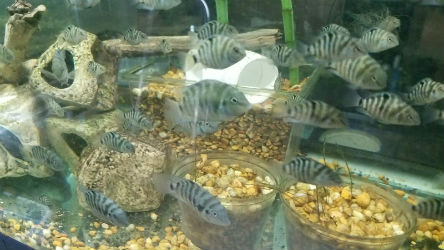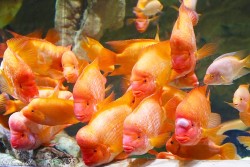Convict Cichlid Care for Beginners

Convict Cichlid Care: A Comprehensive Guide
Convict cichlids (Amatitlania nigrofasciata) are a popular choice among aquarium enthusiasts due to their striking appearance, hardy nature, and fascinating behavior. These Central American cichlids are relatively easy to care for, making them suitable for both beginner and experienced aquarists. In this comprehensive guide, we'll explore the key aspects of caring for convict cichlids in your home aquarium.
1. Tank Setup and Size:
- Convict cichlids can be kept in a variety of tank sizes, but a 20-gallon tank or larger is recommended for a pair or a small group.
- Provide ample hiding places and caves using rocks, driftwood, and aquarium decorations to create territories and reduce aggression.
2. Water Parameters:
- Convict cichlids thrive in a tropical freshwater environment.
- Maintain a water temperature between 75-82°F (24-28°C).
- Keep the pH level around 6.5-8.0.
- Water hardness (GH) should range from 6-16 dGH.
3. Filtration:
- Invest in a good-quality filtration system as convict cichlids can be messy eaters. Canister filters or hang-on-back filters are popular choices.
- Ensure efficient water circulation and perform regular water changes to maintain water quality.
4. Decor and Substrate:
- Use fine gravel or sand as the substrate, as these cichlids like to dig and sift through the substrate.
- Provide hiding spots, caves, and rocky formations to mimic their natural habitat and create territories. This helps reduce aggression and stress.
5. Tank Mates:
- Convict cichlids can be aggressive, especially during breeding, so choose tank mates carefully.
- Suitable tank mates may include other Central American cichlids, robust catfish species, or fish that can hold their own in case of territorial disputes.
- Avoid keeping them with very passive or small fish.
6. Diet:
- Convict cichlids are omnivores and have a varied diet in the wild.
- Feed them a balanced diet that includes high-quality cichlid pellets or flakes, live or frozen foods like brine shrimp, bloodworms, and chopped vegetables.
- Offer a mix of protein and plant-based foods to meet their nutritional needs.
7. Behavior and Compatibility:
- Convict cichlids are known for their territorial and sometimes aggressive behavior, especially during breeding.
- Provide plenty of hiding spots to reduce aggression.
- They are attentive parents and will care for their fry, which can be fascinating to observe.
8. Breeding:
- Convict cichlids are prolific breeders and relatively easy to breed in captivity.
- They form monogamous pairs and will typically lay their eggs on a flat surface or in a pit.
- The parents guard the eggs and fry, making them excellent caregivers.
9. Health and Common Issues:
- Like all aquarium fish, convict cichlids can be susceptible to common diseases, including ich (white spot disease) and fungal infections.
- Maintain proper water quality, provide a balanced diet, and quarantine new fish to prevent health issues.
10. Conclusion:
- Convict cichlids are a fascinating and hardy addition to the aquarium hobby, suitable for both beginners and experienced aquarists.
- By creating a suitable tank environment, providing proper care, and understanding their behavior, you can enjoy the beauty and charm of these unique cichlids in your own home aquarium.

FAQ's
What are convict cichlids, and where are they from?
Convict cichlids, scientifically known as Amatitlania nigrofasciata, are a type of cichlid fish native to Central America, particularly regions of Honduras, Guatemala, Nicaragua, and Costa Rica. They are popular in the aquarium hobby due to their distinctive appearance and interesting behavior.
What is the typical size of adult convict cichlids?
Adult convict cichlids typically reach a size of around 4 to 6 inches (10-15 cm) in length when kept in home aquariums.
Can I keep convict cichlids in a community aquarium with other fish?
Convict cichlids are known for their territorial and sometimes aggressive behavior. While they can be kept with certain tankmates, it's essential to choose compatible fish that can handle their behavior or have similar temperaments. Other Central American cichlid species and robust fish may be suitable.
What is the ideal tank setup for convict cichlids?
To provide suitable care for convict cichlids, consider the following tank setup:
- Tank size: A 20-gallon tank or larger is recommended for a pair or small group.
- Substrate: Fine gravel or sand is ideal as they enjoy digging.
- Decor: Provide plenty of hiding spots, caves, and rocky formations to mimic their natural habitat.
- Filtration: Invest in efficient filtration to maintain water quality.
- Water parameters: Maintain a temperature of 75-82°F (24-28°C), a pH level of 6.5-8.0, and water hardness (GH) of 6-16 dGH.
What should I feed my convict cichlids?
Convict cichlids are omnivores and have a varied diet. Offer them high-quality cichlid pellets or flakes as a base diet, supplemented with live or frozen foods like brine shrimp, bloodworms, and chopped vegetables. A mix of protein and plant-based foods is essential to meet their nutritional needs.
How can I breed convict cichlids in my aquarium?
Breeding convict cichlids is relatively straightforward. They are known for their prolific breeding behavior. To encourage breeding, provide suitable flat surfaces or pits for them to lay their eggs. Once they form a pair, they will typically take care of their eggs and fry. Ensure proper tank conditions and adequate hiding spots for the fry.
Are convict cichlids suitable for beginners in the aquarium hobby?
Yes, convict cichlids are often recommended for beginner aquarists due to their hardy nature and ease of care. However, be prepared for their territorial behavior and potential aggression, especially during breeding.
What are some common health issues that affect convict cichlids?
Convict cichlids can be susceptible to common aquarium fish diseases like ich (white spot disease) and fungal infections. Maintaining proper water quality, providing a balanced diet, and quarantining new fish before introducing them to an established tank can help prevent health issues.
Can convict cichlids be kept with plants in the aquarium?
Convict cichlids may dig and rearrange substrate, which can disturb or uproot aquarium plants. If you wish to keep live plants in their tank, choose hardy and well-rooted species or use plant anchors to secure them in place.
Do convict cichlids exhibit interesting behavior in the aquarium?
Yes, convict cichlids are known for their intriguing behavior, which includes digging, territorial disputes, and parenting behavior. They are attentive parents and will guard and care for their fry, making them fascinating to observe in the aquarium.








